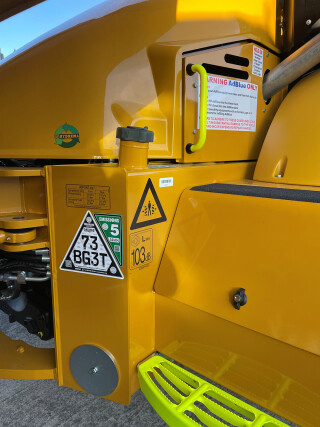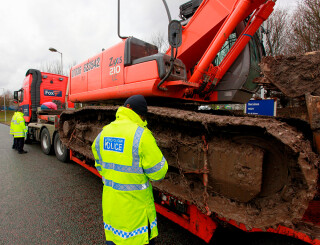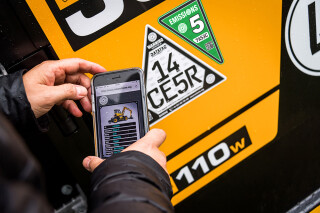The Equipment Theft (Prevention) Act received royal assent on 20th July this year. A private members Bill introduced by Buckingham MP Greg Smith, it makes provision “to prevent the theft and re-sale of equipment and tools used by tradespeople and agricultural and other businesses; and for connected purposes”.
The hope is that the legislation will make it harder to steal equipment, harder to resell stolen equipment and easier for police to ascertain rightful ownership.
While the legislation applies only to England and Wales, its seems likely that Scotland, if not Northern Ireland, might follow suit.
And while agriculture is mentioned in the preamble and loomed large in the relevant debates in parliament, construction is not and did not. That is significant because, it seems, construction industry organisations rather seem to wish that the legislation had never been drafted – which, given how widespread tool and plant theft is, seems surprising.
Quad bikes and all-terrain vehicles are specified in the Act but secondary legislation will enable it to be expanded to cover other equipment including tradespeople’s tools.
According to Opal, the police national intelligence unit for organised acquisitive crime, reporting of agricultural and construction equipment thefts increased by 14% in 2022 to 3,446 offences compared with 3,022 offences in 2021. There was also a 23% increase in fuel theft reporting, likely due to changing legislation regarding red diesel sales, the police surmise.
A different source of statistics (an analysis of police force data by Direct Line for Business) found that 35,098 tool thefts were reported to the police in 2022 across England, Wales and Northern Ireland, marking a 13% increase in reported cases in 2021. This equates to a tool being stolen once every 15 minutes on average, up from once every 17 minutes the previous year.
According to insurer NFU Mutual, 89% of tradespeople and contractors have been victims of theft but only 59% of them record equipment serial numbers – a crucial identification tool.
Detective Constable Chris Piggott, field intelligence officer for the National Construction and Agri Thefts Team (NCATT), says: “We often end up on warrants and searches where numerous high-value power tools are located. If serial numbers are not recorded these will be untraceable and cannot returned to their rightful owners.
“There is nothing more frustrating than having to hand suspected stolen property back to a known offender because the person who has lost them didn’t take the time to accurately record the information when they purchased them,” adds Piggott. “This ultimately means that we also can’t prosecute and bring offenders to justice, meaning they can carry on stealing tools without fear of retribution.”
Recovery of stolen construction machinery has improved since the launch of the CESAR, the Construction Equipment Security And Registration scheme, by the Construction Equipment Association (CEA) back in 2007. Under the scheme, machines can be tagged, usually by the manufacturer, and registered on a database. If police encounter a machine suspected of being stolen, the Datatag ID can be checked and the rightful owner identified.
The CESAR scheme has widespread support, from the Home Office, the police, construction trade associations, from insurance companies and from practically all right-thinking folk. Of course it does. What’s not to like?
So the question is, why aren’t all machines CESAR registered?
With the Equipment Theft (Prevention) Act, perhaps soon they all will be. The Act itself is merely enabling legislation, empowering the home secretary to introduce secondary legislation requiring equipment to have some sort of tagging – not necessarily with Datatag or through CESAR but at least with a similar unique indelible identifier – to help police do their job.
During the summer the Home Office ran an eight-week call for evidence to seek views on proposed details to be included in secondary legislation.

Some in the construction industry are rather hoping that, with the existence of CESAR, owners of construction machinery will just be left alone. After all, the call for evidence did not even mention construction plant or tools. It said, categorically: “The purpose of the Bill is to prevent the theft of machinery and equipment used by the agricultural sector, in particular quad bikes and all-terrain vehicles (ATVs).”
Quad bike theft is indeed a huge issue and a massive ball-ache for farmers, with between 800 and 1,100 thefts per year in recent years. But that is chicken feed compared to the figures for overall equipment and tool theft.
Superintendent Andrew Huddleston of the National Rural Crime Unit, based at Northumbria Police HQ, worked with Greg Smith MP in the drafting of his Bill and is now part of the team writing the secondary legislation, along with policing minister Chris Philp. Anyone thinking this legislation is just about farmers is mistaken, he says.
“This Bill is absolutely targeting the construction industry. Period,” he states categorically. “If you look at the thefts we are getting across the board, we see more stolen construction equipment than agricultural. We are now in the process of writing the secondary legislation. The minister and I want it to apply to everything.”
The plan, says Huddleston, is for professional power tools to be required to have some sort of forensic marking enabling ownership to be traced – perhaps something as simple as Smart Water, although the legislation will avoid mandating specific brands or schemes. Larger machinery will likely be required to have immobilisers fitted.
Huddleston has been making waves. “Some power tool manufacturers have stopped talking to me,” he says. “I am disappointed at manufacturers’ responses.”
Among the challenges for manufacturers – most of whom are based overseas – is deciding whether to have a specific production line for UK market shipments to be security tagged, or to get dealers to do it.
When CESAR was first set up, says Huddleston, agriculture manufacturers adopted it more quickly because NFU Mutual, the farmers’ insurance company, offered a 10% discount if a machine had CESAR on it. John Deere jumped quickly at the commercial opportunity, then Massey Ferguson. Remarkably, there is no similar insurance inducement promoting construction industry adoption.
Quad bikes tend not to be tagged, however. And after years of tackling rural crime, Huddleston has come to the conclusion that this is the way the manufacturers would prefer to keep it.
“Leading manufacturers don’t like it,” he says, “because 10% or more, I estimate, of their sales are theft replacement. Quad bike manufacturers don’t want to cannibalise their sales.”
Some construction machinery manufacturers are the same, he says.

“I’ve met with construction equipment manufacturers and they know that sales, in some sectors, are down to theft replacement,” he says.
In other words, plant theft is part of their business model.
Huddleston is reluctant to name names because he doesn’t want to alienate manufacturers more than he already has. But anyone in the industry that buys equipment will know exactly who it is he is talking about: consider those who offer security marking and immobilisers as standard, those who don’t, and those who have universal keys. “There are some manufacturers that use the same key for all their machines,” he says.
As Lord Blencathra told the House of Lords when urging support for the Bill: “Let the message go out to a minority of manufacturers that their sales strategy of selling equipment which can be easily stolen so that they can sell replacements over and over again is coming to an end.”

But it’s not just the manufacturers that fall short; some hire companies are not fully engaged in theft prevention. “We’ve also got an industry-wide problem with hire fraud,” Huddleston says – referencing bogus customers who order kit to be delivered and then disappear with it.
Some hire companies, he says, actually want tools and machinery stolen from time to time so they can renew it on the insurance. Under CPA contract conditions, if equipment is stolen it comes out of the customer’s insurance, not the hire company’s
CPA legal manager David Smith thinks this is an overly cynical reading. “Lead times for buying new plant is very long so it is not really in the interests of fleet owners to have it stolen,” he says.
Huddleston is not suggesting that everyone is at it. He names Sunbelt, among the hire companies, as one of the good guys, and Caterpillar and JCB among the manufacturers working to improve security. “Their business model is not based on theft,” he says. “When JCB introduced digital keys, thefts plummeted.” Hitachi, too, has done “brilliant work” he says.
An outside observer might expect Huddleston to have widespread support for his work in this field. But there are a lot of vested interests involved.
Organisations contacted for this article generally offered a response prefaced with “we support the aims of this legislation but…”. Some would not even go that far. The Construction Plant-hire Association (CPA) said that it was not even prepared to disclose its position or how it responded to the Home Office call for evidence. The Agricultural Engineers Association (AEA) was not so coy and has shared its extensive concerns in full. (See below.)
Huddleston says: “£350,000 we got back last week that had been stolen in a hire fraud. Why wouldn’t the hire associations support us?”
Even Datatag, which is in the very business that the Equipment Theft (Prevention) Act promotes, fears that some cheaper option may be deemed acceptable. “CESAR is now fitted as standard to the majority of self-propelled construction plant and agricultural machinery at factories around the globe, with over 600,000 machines protected since 2007,” says Datatag marketing manager Miles Taylor.
“CESAR is the largest and most successful forensic marking scheme in the UK (based on volume of machines fitted with the system) so we were an obvious reference point in the early stages of the development of the Equipment Theft (Prevention) Act. We are hopeful that any final agreed technology standard will, at the very least, mirror the proven technology requirements of the CESAR scheme, now widely considered to be the industry standard.”

Some of the lukewarm response to the legislation can doubtlessly be attributed to potential costs to end-users.
Greg Smith addressed this in the House of Commons during the passage of the Bill: “I understand there is some criticism that the cost to the end user will be an additional burden but, given that forensic marking costs between £20 and £30 per product and an immobiliser fitted at the point of sale, rather than in the factory, costs between £70 and £100, the cost of ensuring that equipment is safe and has less chance of being stolen is not very high at all, particularly when we factor in the expected reduction in annual insurance premiums for such products, which many in the industry inform me will more than offset the initial cost of this measure at the point of purchasing a new quad bike, a new tractor GPS unit or whatever equipment it might be.
“The police say the Bill will make a huge difference and, having grown up in a police family, I put an enormous amount of trust in our police. I want to ensure that the professionals who go out each day to keep us and our property safe have every power, resource, law and regulation they need to deter would-be criminals, and to bring to justice those who commit crime. I have great confidence that this Bill will do that.”
What’s wrong with the Equipment Theft (Prevention) Act?
While the Construction Plant-hire Association refused to share its thoughts on the legislation, the Agricultural Engineers Association spoke out during the Bill’s passage. Here’s what it said:
"The AEA and our members support the aims of the Bill and have not opposed it during its passage through Parliament. However, we are concerned that the proposers and supporters of the Bill have significantly underestimated the legal complexity and cost of complying with the proposed measures. The proposals in the call for evidence in its current form would impose a new layer of regulation and considerable bureaucracy on the industry, over and above what is required by current legislation, much of which is formed from retained and transposed EU law. If implemented via future legislation, they would be detrimental to everyone in the supply chain and especially dealers and purchasers of the vehicles and machines in scope of any resulting regulations in England & Wales.
“In particular, because the Bill would place responsibilities on the seller of the new vehicles and machines concerned, it has the potential to conflict with existing, long-standing product safety legislation. If implemented without addressing these conflicts, the Bill’s provisions relating to fitting of immobilisers would put machinery dealers and other sellers of vehicles and machines in an impossible position. It would be illegal for them to sell affected vehicles or machines without an immobiliser fitted.
"However, if they were to fit an immobiliser meeting the specification proposed, they would contravene the product safety legislation. Therefore, it would be impossible to legally sell affected machinery or vehicles in England and Wales.
“This situation could potentially be avoided by manufacturers fitting immobilisers to their vehicles and machines. However, doing so would be complex, costly and time consuming. The necessary redesign, testing and approval of products, redesign and implementation of production processes and training of staff would require several years to complete and would involve manufacturers incurring considerable costs. To avoid the scenario where it is illegal to sell machinery or vehicles, an implementation period of 3-5 years would be required. For products with limited sales in the UK, the process is unlikely to be economically viable. Therefore, these products would be withdrawn from the market, reducing the choice available to customers. Those models which remain would inevitably be significantly more expensive, as the full costs would need to be passed on to customers in England and Wales.
“The AEA supports the proposals around forensic marking of ATVs, side-by-side vehicles and other mobile agricultural vehicles and machinery. However, the proposals relating to professional powered hand tools are impractical. These products are manufactured on a large scale for the global market in factories around the world and leave the production line boxed. The addition of forensic marking by the seller will require products to be unboxed for its application. That would be labour-intensive and incur significant extra cost, putting sellers in England and Wales at a marked disadvantage to online sellers and those from elsewhere. Due to the volumes and complexity of the supply chains, it would not be feasible to fit forensic marking on production lines in most cases."
Got a story? Email news@theconstructionindex.co.uk

![More than 35,000 tool thefts were reported to the police in 2022 across England, Wales and Northern Ireland [image courtesy of NFU Mutual]](/img-cache/77e95d8d13fd63d608325aa6967b3528/750x500_top_1701094958_pic-c-tools-in-van-credit-nfum-.jpg)

